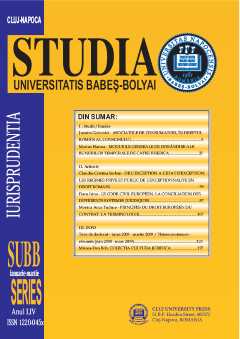THE LONG LIFE OF LAESIO ENORMIS
THE LONG LIFE OF LAESIO ENORMIS
Author(s): Rena Van Den BerghSubject(s): Law, Constitution, Jurisprudence
Published by: Studia Universitatis Babes-Bolyai
Keywords: contract of purchase and sale; iustum pretium; laesio enormis; reception; transplantation; substantive unfairness.
Summary/Abstract: Although it is often said that the price in a contract of purchase and sale must be iustum (fair or just), it was not a requirement for the validity of the contract in Roman law. In classical Roman law of sale no account was taken of unequal bargaining power in the parties and they were entire free to fix the price, there being no requirement that the price must be adequate or fair. In late Roman law, however, there was an attempt to require a “just” price in a contract of purchase and sale. The doctrine upon which this was built, was known as laesio enormis. This Roman-law doctrine was later received in the Netherlands and although it extended to contracts generally, it was specifically applicable to contracts of sale. In Roman-Dutch law contracts could therefore be rescinded on the basis of laesio enormis in cases in which a person was prejudiced to more than half the price. Dutch acceptance of this doctrine shows how strongly the Dutch were bound to the classical tradition. As a successful commercial nation, trading with the greater part of the known world, they still retained this doctrine which was prejudicial to free commercial intercourse. When the Dutch came to the Cape of Good Hope in 1652, they brought their legal system, Roman-Dutch law, along with them and this ensured the continued existence of laesio enormis in South Africa.
Journal: Studia Universitatis Babes Bolyai - Iurisprudentia
- Issue Year: 57/2012
- Issue No: 4
- Page Range: 35-52
- Page Count: 18
- Language: English

